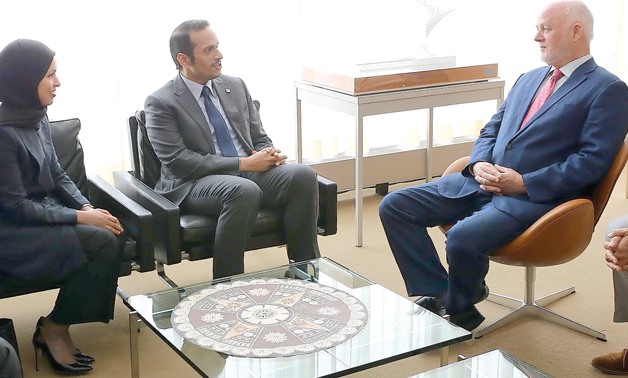
Qatar's Foreign Minister Mohammed bin Abdulrahman Al Thani with the UN General Assembly President, Peter Thomson, in New York- Press Photo
CAIRO – 28 July 2017: Malaysia has expressed readiness to mediate in the Arab-Qatari crisis, while the United Nations (UN) refrained. The Qatari regime has sought new mediators to solve its crisis.
Malaysian Defense Minister Hishammuddin Hussein said in the Parliament on Thursday that the opportunity should be given first to Kuwait as an intermediary in addressing the crisis, noting that the Malaysian government supports the Kuwaiti mediation efforts.
“We closely monitor and, if necessary, our existing ties with the Gulf nations concerned can help and place Malaysia in a position that is not only strategic but can play a more in-depth role,” Hussein added.
In the meantime, Qatar’s Emir Sheikh Tamim bin Hamad Al-Thani has sent a written message to the UN Secretary-General Antonio Guterres demanding the UN to play a role in its crisis with the Arab nations boycotting it on charges of supporting extremists and funding terrorist groups.
“This is the right place where we have to start to seek all our options in order to find a legal solution,” Qatar’s Foreign Minister Mohamed bin Abdulrahman Al-Thani said.
In that context, China's UN ambassador, Liu Jieyi, said that the Gulf crisis should be resolved among the brothers in the Gulf Cooperation Council (GCC), urging direct negotiation between the various sides to sort out any difficulties.
Speaking during an interview with Egyptian channel DMC, Bahraini Foreign Minister Sheikh Khalid said that he does not know what the Emir of Qatar is in pursuit of but he will not succeed – he saw that Doha has played a negative role in the Yemeni file and the Iranian arms sent to Houthis represent a direct threat to Arab states.
The GCC will continue and flourish despite the crisis with Qatar, Sheikh Khalid affirmed.
Qatar’s relations with Egypt, Saudi Arabia, the UAE, and Bahrain have been strained since May 24 following a leaked statement attributed to Qatari Emir Sheikh Tamim bin Hamad, criticizing Gulf foreign policy with Iran, describing it as “unwise.”
The Qatari position prompted the major Arab powers to adopt urgent and strict measures towards Doha. They initially closed their airspace and seaports for Qatari transportation, and then made 13 demands, which Qatar dismissed.
Last week, the quartet urged Qatar to commit to six principles on combating extremism and terrorism and negotiate a plan with specific measures to implement them.
Further, Qatari Foreign Minister Mohammed bin Abdulrahman Al-Thani declared that Washington wishes to end the Gulf crisis, highlighting the Kuwaiti mediation to resolve the crisis.

Comments
Leave a Comment